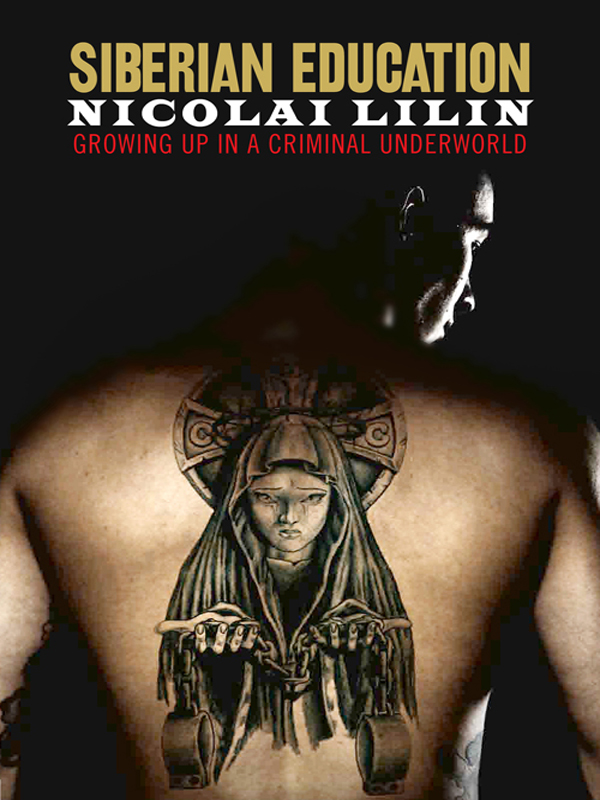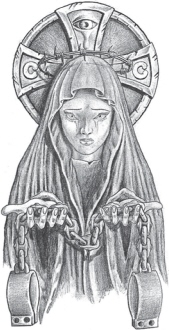Siberian Education



âA fascinating and very readable
account of life in the Siberian
criminal underground.'
RUST Y YOUNG,
AUTHOR OF
MARCHING POWDER
SIBERIAN EDUCATION
NICOLAI LILIN
Translated from the Italian by Jonathan Hunt

TEXT PUBLISHING MELBOURNE AUSTRALIA
The paper used in this book is manufactured only from wood grown in sustainable regrowth forests.
The Text Publishing Company
Swann House
22 William Street
Melbourne Victoria 3000
Australia
textpublishing.com.au
Copyright © Nicolai Lilin 2009
Translation copyright © Jonathan Hunt 2010
All rights reserved. Without limiting the rights under copyright above, no part of this publication shall be reproduced, stored in or introduced into a retrieval system, or transmitted in any form or by any means (electronic, mechanical, photocopying, recording or otherwise), without the prior permission of both the copyright owner and the publisher of this book.
First published in Italy as
Educazione siberiana
by Giulio Einaudi editore s.p.a., Torino, 2009
First published in Great Britain by Canongate Books Ltd, 2010
This edition published by The Text Publishing Company, 2010
All the illustrations that accompany the text are details from original tattoos executed by the author.
Cover design by W.H.
Chong Printed in Australia by Griffin Press
National Library of Australia
Cataloguing-in-Publication data:
Lilin, Nicolai, 1981-
Siberian education / Nicolai Lilin ; translated by Jonathan Hunt.
ISBN: 9781921656323 (pbk.)
Translation of: Educazione Siberiana.
Lilin, Nicolai, 1981--Childhood and youth. Tattoo artists--Dniester Moldovan Republic--Biography. Dniester Moldovan Republic--Social life and customs. Dniester Moldovan Republic--Social conditions.
Hunt, Jonathan, 1951-
391.65092
AUTHOR'S NOTE
This memoir is based on the author's own experiences. Names have been changed, characters combined and events compressed. Certain episodes are imaginative recreation, and those episodes are not intended to portray actual events.
SIBERIAN EDUCATION

âSome enjoy life, some suffer it; we fight it.'
Old saying of the Siberian Urkas
I know it shouldn't be done, but I'm tempted to start from the end.
For example, from the day we ran through the rooms of a ruined building, firing at the enemy from such close range we could almost touch them with our hands.
We were exhausted. The paratroopers worked in shifts, but we saboteurs hadn't slept for three days. We went on like the waves of the sea, so as not to give the enemy the chance to rest, carry out manoeuvres or organize their defences. We were always fighting, always.
That day I ended up on the top floor of the building with Shoe, trying to eliminate the last heavy machinegun. We threw two hand grenades.
In the dust that was falling from the roof we couldn't see a thing, and we found ourselves face to face with four enemies who like us were wandering like blind kittens through the grey, dirty cloud, which reeked of debris and burnt explosive.
I had never shot anyone at such close quarters in all my time in Chechnya.
Meanwhile, on the first floor our Captain had taken a prisoner and killed eight enemies, all by himself.
When I came out with Shoe I was completely dazed. Captain Nosov was asking Moscow to keep an eye on the Arab prisoner, while he, Ladle and Zenith went to check out the cellar.
I sat on the stairs next to Moscow, opposite the frightened prisoner, who kept trying to communicate something. Moscow wasn't listening to him, he was sleepy and tired, as we all were. As soon as the Captain turned his back, Moscow pulled out his pistol â an Austrian Glock, one of his trophies â and, with an arrogant leer, shot the prisoner in the head and chest.
The Captain turned round, and looked at him pityingly without saying a word.
Moscow closed his eyes as he sat down beside the dead man, overcome with exhaustion.
Looking at all of us as if he were meeting us for the first time, the Captain said:
âThis is too much. Everyone into the cars! We're going for a rest, behind the lines.'
One after another, like zombies, we trooped off towards our vehicles. My head was so heavy I was sure that if I stopped it would explode.
We went back behind the lines, into the area controlled and defended by our infantry. We fell asleep instantly; I didn't even have time to take off my jacket and ammunition belt before I fell into the darkness, like a dead man.
Soon afterwards Moscow woke me by hammering the butt of his Kalashnikov on my jacket, at chest level. Slowly and reluctantly I opened my eyes and looked around; I struggled to remember where I was. I couldn't get things into focus.
Moscow's face looked tired; he was chewing a piece of bread. Outside it was dark; it was impossible to tell what time it was. I looked at my watch but couldn't see the digits; everything was hazy.
âWhat's happening? How long have we slept?' I asked Moscow in a weary voice.
âWe haven't slept at all, brother . . . And I think we're going to have to stay awake quite a while longer.'
I clasped my face between my hands, trying to muster the strength to stand up and arrange my thoughts. I needed to sleep, I was exhausted. My trousers were dirty and wet, my jacket smelled of sweat and fresh earth. I was worn out.
Moscow went to wake the others:
âCome on, lads, we're leaving immediately . . . We're needed.'
They were all in despair; they didn't want to get up. But, grumbling and cursing, they struggled to their feet.
Captain Nosov was pacing around with the handset to his ear, and an infantryman was following him around like a pet dog, with the field radio in his rucksack. The Captain was angry; he kept repeating to somebody or other, over the radio, that it was the first break we'd taken in three days, and that we were at the end of our tether. It was all in vain, because eventually Nosov said, in a clipped tone:
âYes, Comrade Colonel! Confirmed! Order received!'
They were sending us back to the front line.
I didn't even want to think about it.
I went over to a metal tank full of water. I dipped my hands into it: the water was very cool; it made me shiver slightly. I put my whole head into the drum, right under the water, and kept it there for a while, holding my breath.
I opened my eyes inside the tank and saw complete darkness. Alarmed, I jerked my head out, gasping for air.
The darkness I'd seen in the tank had shocked me. Death might be just like that, I thought: dark and airless.
I leaned over the tank and watched, shimmering on the water, the reflection of my face, and of my life up to that moment.
Contents
THE EIGHT-GORED HAT AND THE FLICK-KNIFE
THE EIGHT-GORED
HAT AND THE
FLICK-KNIFE
In Transnistria February is the coldest month of the year. The wind blows hard, the air becomes keen and stings your face. On the street people wrap themselves up like mummies; the children look like plump little dolls, bundled up in countless layers of clothes, with scarves up to their eyes.
It usually snows a lot; the days are short and darkness descends very early.
That was the month when I was born. Early, coming out feet first; I was so weak that in ancient Sparta I would undoubtedly have been left to die because of my physical condition. Instead they put me in an incubator.
A kindly nurse told my mother she would have to get used to the idea that I wouldn't live long. My mother cried, expressing her milk with a breast pump to take to me in the incubator. It can't have been a happy time for her.
From my birth onwards, perhaps out of habit, I continued to be a source of worry and distress to my parents (or rather to my mother, because my father didn't really care about anything: he went on with his life as a criminal, robbing banks and spending a lot of time in prison). I've lost count of the number of scrapes I got into when I was small. But it was natural: I grew up in a rough district â the place where the criminals expelled from Siberia were re-settled in the 1930s. My life was there, in Bender, with the criminals, and the people of our villainous district were like one big family.
When I was small I didn't care about toys. What I liked doing when I was four or five was prowling round the house to see if my grandfather or my uncle were taking their weapons apart to clean them. They were constantly doing it, with the utmost care and devotion. My uncle used to say weapons were like women â if you didn't caress them enough they'd grow stiff and betray you.
The weapons in our house, as in all Siberian houses, were kept in particular places. The so-called âpersonal' guns â the ones Siberian criminals carry around with them and use every day â are placed in the âred corner', where the family icons hang on the walls, along with the photographs of relatives who have died or are serving prison sentences. Below the icons and the photographs there is a shelf, draped with a piece of red cloth, on which there are usually about a dozen Siberian crucifixes. Whenever a criminal enters the house he goes straight to the red corner, pulls out his gun and puts it on the shelf, then crosses himself and places a crucifix over the gun. This is an ancient tradition which ensures that weapons are never used in a Siberian house: if they were, the house could never be lived in again. The crucifix acts as a kind of seal, which can only be removed when the criminal leaves the house.
The personal guns, which are called âlovers', âaunts', âtrunks' or âropes', don't usually have any deeper meaning; they are seen as just weapons, nothing more. They are not cult objects, in the way that the âpike', the traditional knife, is. The gun is simply a tool of the trade.